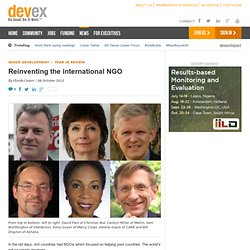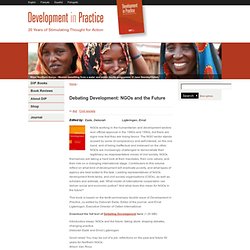

The world of NGOs – Simple, Complex or Complicated? The world of NGOs – Simple, Complex or Complicated? 23/06/2011 at 6:28 am In 2007, David Snowden and Mary Boone published a paper in the Harvard Business Review, entitled “A Leader’s Framework for Decision-making”. In the article, they argue that business leaders need new ways of thinking about their jobs, and that “complexity science” offers useful tools in times of turbulence.
The key point made in the article is that leaders need to tailor their behaviour depending on the degree of complexity and predictability of the environment in which their organisation operates. In “simple” environments, classic management theory applies, as there are few surprises. Also in “complicated” environments can leaders look for facts and “right answers”. Most European NGOs probably operate in such a complicated context, and their leaders must therefore make sure that they have access to expert advice, and that their organisation exposes itself (and listens) to sources of conflicting advice.
Like this: A Wave of Change (2008) International Journal on World Peace, Vol. 24, No. 1 (MARCH 2007), pp. 43-64. NGOs and uneven development. The NGO Scramble: Organizational Insecurity and the Political Economy of Transnational Action. Journal Article, International Security, volume 27, issue 1, pages 5-39 Summer 2002 Authors: Alexander Cooley, James Ron Belfer Center Programs or Projects: International Security; Quarterly Journal: International Security Does the increase in the number of nongovernmental organizations (NGOs) such as international relief groups indicate the presence of a robust global civil society? Few would dispute the contribution of these organizations to alleviating world suffering. For more information about this publication please contact the IS Editorial Assistant at 617-495-1914.
For Academic Citation: Is the faultline among NGOs over the future of development deepening? A paper summarising the academic literature on the role of NGOs in development and poverty reduction has sparked a lively debate on From Poverty to Power, a blog written and edited by Oxfam's Duncan Green. The gist of the June paper by the Brooks World Poverty Institute, University of Manchester, by Nicola Banks and David Hulme, is that NGOs have lost their way. Having started out as grassroots-led development bodies – "heroic organisations" that offered the potential for innovative agendas – NGOs turned into bureaucratic, depoliticised creatures that respond more to the dictates of donors than the people whose interests they claim to represent. "Greater acknowledgment and concerns emerging from their closer proximity to donors and governments than intended beneficiaries also brought into question the very comparative advantages once lauded," wrote the authors.
Green, senior strategic adviser for Oxfam GB, expressed his irritation with the paper on his blog. Green has a point. Trócaire Leading Edge 2020. INTRAC: Civil Society at a new Frontier. Global Futures. Reinventing the international NGO. In the old days, rich countries had NGOs which focused on helping poor countries.

The world’s not so simple anymore. Now, most poverty is in big and rapidly growing economies which, by and large, have their own vibrant and growing NGO communities. At the same time, there are dozens of countries mired in conflict and facing nearly universal poverty. Traditional donors – cash-strapped and pressured to redirect funding toward domestic programs – are cutting their aid budgets and expecting more return on their investments. They are increasingly partnering with local groups and corporations, adding to already stiffening competition in the age of untied aid.
Private investment in the developing world dwarfs aid from foreign governments, forcing the NGO community – which has been accused in recent years of having become too bureaucratic, ineffectual and pandering to donor interests – to rethink its core values and modus operandi. The strengths of iNGOs Value for money Going local Old foes no more. Debating Development: NGOs and the Future. Edited by: Ligteringen, Ernst NGOs working in the humanitarian and development sectors won official approval in the 1980s and 1990s, but there are signs now that they are losing favour.

The NGO sector stands acused by some of complacency and self-interest, on the one hand, and of being ineffectual and irrelevant on the other. NGOs are increasingly challenged to demonstrate their legitimacy as respresentative voices of civil society. NGOs themselves are taking a hard look at their mandates, their core values, and their role on a changing international stage.